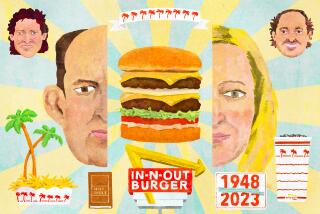‘Diner’ Alumnus Fashioning Corporate Legend : Success story: Baltimore-born Harold Goldsmith is one of a gifted few for whom wealth has come quickly. Friends say the founder of the Merry-Go-Round clothing chain is now building an empire in the thrift industry.
- Share via
BALTIMORE — It’s an uncommonly balmy October evening here at the exclusive Woodholme Country Club. Guests nibble imported crackers smeared with Russian caviar. The Dom Perignon flows. Mock cheerleaders greet guests at the door, begging for autographs.
A raspy-voiced, slightly crazed Wolfman Jack imitator emcees the proceedings; the Vandellas and the Shirelles are belting out ‘50s tunes. The host, Harold Goldsmith, is hanging out near the bandstand.
This is a 10th anniversary party celebrating a decade of wedded bliss for Goldsmith and his second wife, Beth. But it could just as easily be a class reunion for a group of kids from northwest Baltimore who grew up to find fame and fortune in business, entertainment and politics.
The group--which included Goldsmith; his business partner, Leonard (Boogie) Weinglass; and film director Barry Levinson--spent much of the early 1960s hanging out at the Hilltop Diner on Reisterstown Road. That eatery, and the young men who met there, eventually became the inspiration for the film “Diner,” Levinson’s highly acclaimed film about rites of passage.
It was somehow fitting that this bash, attended by so many former “Diner” guys, was being hosted by Goldsmith, the chairman and brains behind the $400-million Merry-Go-Round clothing chain and, by his own design, perhaps the group’s least-known and most successful member.
His financial and real estate acumen turned a handful of downtown row houses--the first of which he got as a bar mitzvah gift--into a banking and retail empire. And Goldsmith, a millionaire many times over at 47, apparently thinks there is a lot more where that came from.
He holds stakes in several Baltimore-Washington-area thrifts and last year waged a protracted, unsuccessful bid for control of Arlington, Va.-based Columbia First Federal Savings & Loan Assn. Ultimately, associates say, he is angling to build a financial empire spanning Maryland, Virginia and the District of Columbia.
“Other guys have hobbies; Harold makes money,” says a Larry Oberfeld, a friend since junior high school.
Goldsmith has already profited handsomely on Merry-Go-Round. Its initial stock offering in July, 1983, netted him $13 million; he walked away with another $16 million in a secondary offering this fall.
And he still owns a sizable piece of the retail chain, about 19%. The stock closed at $18.50 a share last Friday, making his stake worth about $36 million. He also holds most of the stock of Eastern Savings Bank, a privately held Baltimore thrift he bought in 1981.
Friends and associates figure he is worth about $100 million.
“Harold always wanted to be rich. It’s been a real driving force in his life,” says Weinglass, the Merry-Go-Round vice chairman and a longtime friend.
Goldsmith is a member of an elite corporate fraternity, a gifted few for whom success has come with astonishing speed. Says longtime buddy Levinson: “Harold was one of those ‘most-likely-to’ guys, the sort who would do well in business.”
A Lincolnesque countenance, prominent nose and dark curly hair make Goldsmith look more like a scientist than crackerjack financier. He does not care much for the trappings of success, and he buys his clothes off the rack.
People who know him invariably describe Goldsmith as intelligent, focused and above all intense, whether adding a new filly to his stable of businesses or devoting an hour to lifting weights.
Says Barry Stern, a childhood friend who runs a Washington development firm: “If Harold decides to work out from 1 to 2 and you call him at 1:30, you can forget it.”
For a man so well-known in business circles, though, Goldsmith is private, intensely so. In more than a decade as president of publicly held Merry-Go-Round, he never granted an interview.
His aversion to publicity is only one facet of a complex, contradictory personality. His 7,000-square-foot hilltop mansion is filled with personal treasures amassed over the years, among them fine Persian rugs and an antique mahogany Steinway. But it is empty most of the time: He lives mostly in Aspen, Colo.
He eschews public displays of affection, swears liberally and can be downright ornery at times, yet he is generous almost to the point of eccentricity. He was once so wowed by some design work done by Trahan Burden & Charles that he sent the advertising agency more money than the contract called for. “It was the only time a client ever said we didn’t charge them enough,” principal Allan Charles recalls.
Harold Goldsmith and his older sister, Ilene, grew up in a modest home above their father’s grocery store in East Baltimore. Childhood friends remember the family as a close-knit one that stressed the traditional values of education and hard work. His father, a great believer in moving up in the world, bought real estate on the side.
A gifted student, young Harold skipped a couple of grades and, as a result, often hung around with peers a couple of years older than he was. In junior high school, he met the buddies that would later become the “Diner” crowd.
Even then, the gaunt, bespectacled kid had a reputation for smarts and an amazing dexterity with numbers. Chip Silverman, a member of the group and author of “Diner Guys,” a book that follows the characters of “Diner” through four decades, remembers Harold winning many a late-night bet with his ability to add numbers in his head.
He was also known for dropping liars in their tracks, friends recall. Guys would come into the diner boasting of their accomplishments in sports or with girls. Harold would cross-examine them so skillfully that people started checking to see whether he was around before spinning tall tales.
Goldsmith enrolled at the University of Maryland, where he majored in English literature. Associates say he could have graduated at 19 but dropped out a couple of semesters shy of that to go into his father’s real estate business. According to Silverman’s book, he eventually completed his education and returned to the family’s real estate business. A few years later, he went into business with old friend Stern.
Meanwhile, Weinglass was trying his hand in the retail business. In 1968, he and a partner put up $750 apiece and bought a supply of jeans and other counterculture gear in New York. They rented a place on Atlanta’s Peachtree Street and called it Merry-Go-Round. To get publicity, they pulled such outrageous stunts as dressing in drag or giving free clothes to the fifth Asian or seventh black person to cross the threshold.
A couple of years later, Goldsmith called Weinglass for advice on opening his own shop in Baltimore and ended up making his old friend an offer: half his real estate for a 50% stake in Merry-Go-Round.
Whether he plans to make a run at another thrift remains to be seen. But he has apparently shaken up the management of at least one of the companies he owns shares in. Maryland Federal Savings & Loan of Hyattsville, a profitable, 15-branch thrift in which he acquired a 5.2% stake, hastily called a special stockholders meeting in September and adopted defensive measures against a hostile takeover.
But whatever moves Goldsmith makes to build a regional financial empire, he will be making them from a distance. A couple of years ago, Goldsmith moved from Baltimore to Aspen in an attempt to slow down. Has it worked? Well not exactly. These days he talks about business deals while hiking mountain trails.
Is Harold Goldsmith really out to create an S&L; empire? Only time will tell. But based on his successes, a lot of people can see it happening. “I think he could visualize owning a group of thrifts,” Stern says.
More to Read
Inside the business of entertainment
The Wide Shot brings you news, analysis and insights on everything from streaming wars to production — and what it all means for the future.
You may occasionally receive promotional content from the Los Angeles Times.










